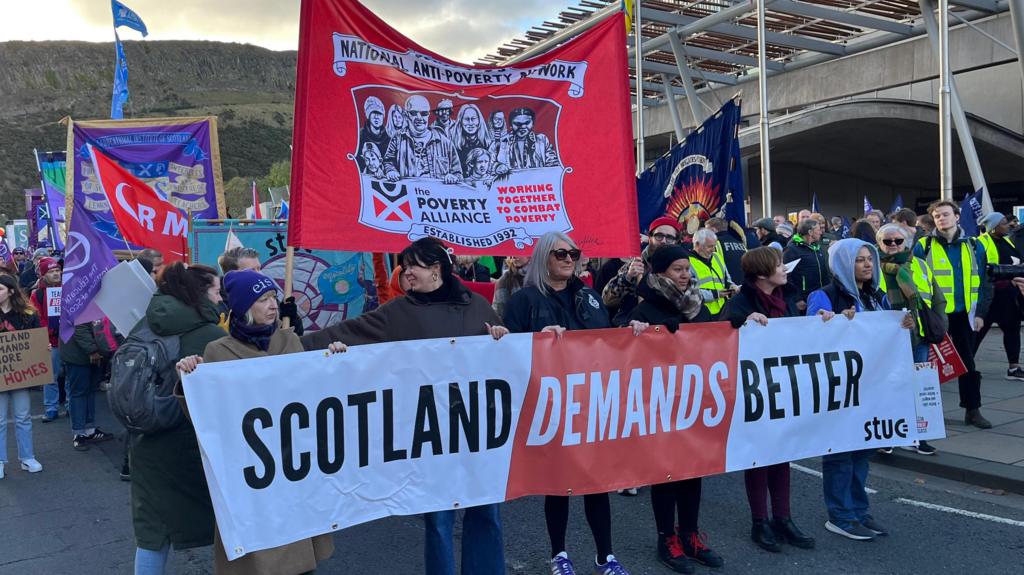Thousands rallied in Edinburgh’s city center to advocate for intensified efforts to combat poverty in Scotland.
Organized by trade unions and charities, the “Scotland Demands Better” demonstration aimed to galvanize action on poverty ahead of the forthcoming UK Budget and next year’s Scottish Parliament elections.
Spearheaded by the Scottish Trades Union Congress (STUC) and The Poverty Alliance, the demonstration called for expanded free childcare provisions and the elimination of the two-child benefit cap.
The march follows recent research from The Poverty Alliance indicating that one in four children in Scotland are currently living in poverty.
The demonstration drew participation from trade union members, faith-based groups, and various community organizations. Marchers proceeded from the Scottish Parliament to the Meadows, where a rally was subsequently held.
Organizers framed the demonstration as part of an “expanding nationwide campaign” advocating for improved employment opportunities and social security measures.
Furthermore, demonstrators are seeking increased investment in essential resources, including housing, transportation, healthcare, and education.
Peter Kelly, chief executive of The Poverty Alliance, characterized the march as a direct response to the ongoing challenges faced by individuals throughout Scotland.
“Too many of us are going hungry, or are without a home, or sacrificing meals to feed their children, dreading winter due to heating costs, or struggling to get by on wages that don’t cover their household costs,” he stated.
STUC General Secretary Roz Foyer emphasized the public’s demand for tangible action to address poverty, urging an end to mere electioneering on the issue.
“People are exhausted with the false promises of change that come every time an election rolls around only to be badly let down time and time again,” she asserted.
Members of the Unite union were present, waving flags to call for the preservation of the Grangemouth refinery.
Unite Secretary Susan Fitzgerald commented: “Scotland is losing highly skilled jobs, decent affordable housing remains out of reach and public services remain underfunded and overstretched. Wages and living standards just aren’t keeping up.”
The Child Poverty (Scotland) Act 2017 established targets aimed at reducing child poverty to 18% by 2024/25 and 10% by 2030/31.
Earlier this month, the Joseph Rowntree Foundation cautioned that these targets are projected to be missed by a “large margin.”
While child poverty rates in Scotland are lower than in other parts of the UK and are currently decreasing, the Scottish government failed to meet its interim target of reducing the rate below 18% by last year, with the current rate standing at 23%.
Prior to the march, First Minister John Swinney extended his “best wishes” to those participating.
He further stated: “Of course those marching today are right that too many people are living in poverty and too many people – many of them in work – are struggling to make ends meet.
“In a country as rich as Scotland, that is simply not acceptable to me.”
A UK government spokesperson affirmed that ministers are “determined to bring down poverty and have implemented measures such as increasing the national minimum wage and introducing universal credit changes.”
A strategy to address child poverty is slated for publication later this year.
The first minister has spoken out to comfort Sheku Bayoh’s family after the inquiry chairman and counsel resigned.
The Scottish Conservatives, who obtained the information, say taxpayers are being “left to pick up the tab”.
A review of the front page stories from the daily newspapers in Scotland.
More than a million people in the UK experience symptoms of Seasonal Affective Disorder – but a project is aiming to help people in Orkney look after their mental health.
The nosey creature swam with them as they paddled under the Forth Rail Bridge in the Firth of Forth.

